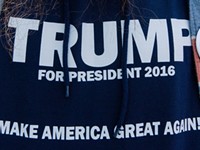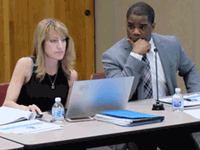[
{
"name": "500x250 Ad",
"insertPoint": "5",
"component": "15667920",
"parentWrapperClass": "",
"requiredCountToDisplay": "1"
}
]
Here we go again.
Another country far away is blowing itself up. And once more, here in The Homeland we're debating whether we should get involved.
That the blow-up is taking place in Iraq adds to the complexity (and the heat) of the debate. In the Washington Post, Fareed Zakaria warns that aiding the Iraqi government would be "defending the indefensible." The New York Times urges that the US "simply cannot be sucked into another round of war in Iraq."
Lashing out from the other side, predictably, is Arizona's John McCain, who says President Obama is to blame. The reason: Obama pulled US troops out of Iraq in 2011.
According to Politico, in a recent MSNBC interview "McCain said repeatedly that the US 'had the conflict won' after the 2007 troop surge, with Iraq maintaining a stable government and Al Qaeda extremists largely defeated."
But when Obama had US troops come home without leaving a residual force behind, McCain said, he let the situation in Iraq deteriorate. Now, McCain insisted, "this has turned into one of the most serious threats to American security in recent history."
America seems very tired of war, and I don't think the hawks in Congress will find much support for more military action in Iraq. But that doesn't mean we'll be united. President Obama's supporters will applaud his caution; his opponents will take this as one more example of incompetence.
But the opponents are ignoring history. The violence we're seeing now, in Iraq and in other countries in the region, grew out of centuries of conflicts within these countries – quite a bit of it abetted by decisions made and boundaries established by outsiders like, well, the United States.
It also seems clear that the current blow-up in Iraq stems from the treatment of Sunnis by Prime Minister Nouri al-Maliki and his Shiite supporters. But Americans' conviction that we can fix everything persists. David Brooks and others insist that if we had kept a small force in Iraq, we would have been able to, as Brooks put it, "restrain Maliki's sectarian tendencies."
How long would it have taken, and how many lives would it have cost, to "restrain Maliki's sectarian tendencies"? It was a struggle while we were there. Would we have really been able to force him to have a more inclusive government? Would he ever have done enough to satisfy the Sunnis and the militants now wreaking havoc in Iraq?
If we had a small, "restraining" force there now, what would it have done in the face of the militants' onslaught?
And, by the way, the US had no choice when it pulled out the troops. Go back and read the news reports from 2010 and 2011. Maliki wanted us out, and we had signed an agreement pledging to leave by the end of 2011. The Obama administration, increasingly worried that Iraq wasn't stable enough for us to leave, tried to get an extension. Maliki refused.
In a lengthy interview with the Wall Street Journal in late 2010, Maliki insisted that his government and Iraqi security forces were able to handle things on their own. Americans would leave at the end of 2011, as the US and Iraq had agreed.
"This agreement is not subject to extension, not subject to alteration," he told the Journal. "It is sealed."
An October 2011 Atlantic article quotes some strongly pro-American Iraqi leaders saying we needed to go.
"We have serious security problems in this country and serious political problems," former Iraqi Prime Minister Ayad Allawi told The Atlantic. But, he said: "Keeping Americans in Iraq longer isn't the answer to the problems of Iraq. It may be an answer to the problems of the US, but it's definitely not the solution to the problems of my country."
And while some Kurdish leaders wanted us to stay, Kurdish legislator Mahmoud Othman told The Atlantic this: "Personally, I no longer want them to stay. It's been eight years. I don't think having Americans stay in Iraq will improve the situation at all. Leaving would be better for them and for us. It's time for us to go our separate ways."
Clearly, President Obama has set us on a new path in foreign policy. It's not the path George Bush and Dick Cheney had us on, and it's not the path Mitt Romney would have had us on. But it's a sensible path.
It's hard to read about the disaster unfolding in Iraq, hard look at the photos of families fleeing their homes, carrying their frightened children. But the United States cannot police the world. Nor should it. And when we try – whether for misguided but well-intentioned reasons or for unsaid selfish reasons (oil often among them), we often do more harm than good.
Maybe the hawks shouting for involvement in Iraq should read a bit of the history of that part of the world. And maybe they should reread some of the newspaper articles about our foreign policy debates.
For example: During the Republicans' primary fights in June 2011, Wall Street Journal columnist Peggy Noonan, a proud Republican, noted that even some of the most conservative candidates were reconsidering their party's militaristic foreign-policy approach. The party, she wrote, seemed to be "inching its way back from 10 years of un-Republican behavior, from a kind of dreaminess about the world: 'Everybody wants to be like us.'"
"Actually," Noonan wrote, "everyone doesn't."
And Noonan wrapped up her column this way: "The problem with Afghanistan, and Iraq for that matter, is not only that after 10 years our efforts have turned out to be – polite word – inconclusive. We are spending money we don't have for aims we cannot even articulate."
Obama's careful study and cautious behavior isn't sexy. And it's not as adrenalin producing as a gun-blazing policy of shock and awe. But it's not a policy of isolationism. It's a policy of informed realism. And it's a darned good national security policy.
Speaking of...
-

Trump voters and jobs: gains haven’t been equal
Jan 3, 2017 -
![[UPDATED] Paladino apologizes for perverse wish list](https://media2.roccitymag.com/rochester/imager/u/review/2940637/schlia_trump-18.jpg)
[UPDATED] Paladino apologizes for perverse wish list
Dec 23, 2016 -

Feedback 11/30
Nov 30, 2016 - More »
Latest in Urban Journal
More by Mary Anna Towler
-

Police reform: advocates on what should come next
Oct 22, 2019 -

Court clears the way for Police Accountability referendum
Oct 17, 2019 -

Dade outlines initial actions on district deficit
Oct 9, 2019 - More »






